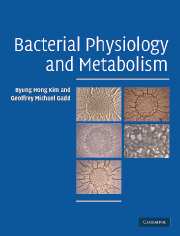Book contents
- Frontmatter
- Contents
- Preface
- 1 Introduction to bacterial physiology and metabolism
- 2 Composition and structure of prokaryotic cells
- 3 Membrane transport – nutrient uptake and protein excretion
- 4 Glycolysis
- 5 Tricarboxylic acid (TCA) cycle, electron transport and oxidative phosphorylation
- 6 Biosynthesis and microbial growth
- 7 Heterotrophic metabolism on substrates other than glucose
- 8 Anaerobic fermentation
- 9 Anaerobic respiration
- 10 Chemolithotrophy
- 11 Photosynthesis
- 12 Metabolic regulation
- 13 Energy, environment and microbial survival
- Index
Preface
Published online by Cambridge University Press: 05 September 2012
- Frontmatter
- Contents
- Preface
- 1 Introduction to bacterial physiology and metabolism
- 2 Composition and structure of prokaryotic cells
- 3 Membrane transport – nutrient uptake and protein excretion
- 4 Glycolysis
- 5 Tricarboxylic acid (TCA) cycle, electron transport and oxidative phosphorylation
- 6 Biosynthesis and microbial growth
- 7 Heterotrophic metabolism on substrates other than glucose
- 8 Anaerobic fermentation
- 9 Anaerobic respiration
- 10 Chemolithotrophy
- 11 Photosynthesis
- 12 Metabolic regulation
- 13 Energy, environment and microbial survival
- Index
Summary
Knowledge of the physiology and metabolism of prokaryotes underpins our understanding of the roles and activities of these organisms in the environment, including pathogenic and symbiotic relationships, as well as their exploitation in biotechnology. Prokaryotic organisms include bacteria and archaea and, although remaining relatively small and simple in structure throughout their evolutionary history, exhibit incredible diversity regarding their metabolism and physiology. Such metabolic diversity is reflective of the wide range of habitats where prokaryotes can thrive and in many cases dominate the biota, and is a distinguishing contrast with eukaryotes that exhibit a more restricted metabolic versatility. Thus, prokaryotes can be found almost everywhere under a wide range of physical and chemical conditions, including aerobic to anaerobic, light and dark, low to high pressure, low to high salt concentrations, extremes of acidity and alkalinity, and extremes of nutrient availability. Some physiologies, e.g. lithotrophy and nitrogen fixation, are only found in certain groups of prokaryotes, while the use of inorganic compounds, such as nitrate and sulfate, as electron acceptors in respiration is another prokaryotic ability. The explosion of knowledge resulting from the development and application of molecular biology to microbial systems has perhaps led to a reduced emphasis on their physiology and biochemistry, yet paradoxically has enabled further detailed analysis and understanding of metabolic processes. Almost in a reflection of the bacterial growth pattern, the number of scientific papers has grown at an exponential rate, while the number of prokaryotic genome sequences determined is also increasing rapidly.
- Type
- Chapter
- Information
- Bacterial Physiology and Metabolism , pp. xxi - xxiiPublisher: Cambridge University PressPrint publication year: 2008



